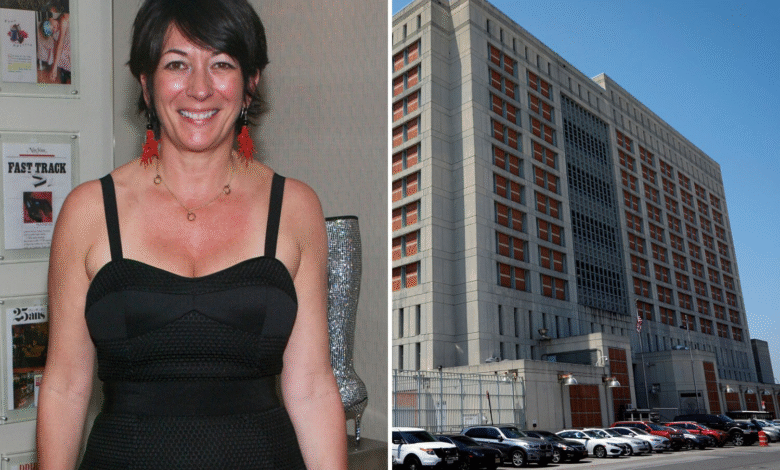Ghislaine Maxwell Prison Transfer Sparks Trump Criticism

In a startling development, Ghislaine Maxwell’s recent prison transfer from Florida to a less secure facility in Texas has ignited widespread outrage among Jeffrey Epstein’s victims. Following the transfer, two victims, Annie and Maria Farmer, along with Virginia Giuffre’s family, condemned President Donald Trump, implying that this move epitomizes a troubling cover-up. The criticism echoes through social media platforms as the implications of Maxwell’s transfer raise questions about the justice system’s integrity, further compounded by Trump’s historical connections to Epstein and Maxwell. In the backdrop of this prison transfer controversy, advocates for victims of sexual abuse are mobilizing, protesting against what they perceive as preferential treatment afforded to Maxwell. This ongoing situation continues to unfold, capturing public attention as more Ghislaine Maxwell news emerges in the wake of the victims’ fervent calls for justice.
The recent repositioning of Ghislaine Maxwell—a figure embroiled in scandal and linked to the infamous Jeffrey Epstein—into a less stringent correctional facility has stirred significant debate. Advocates and victims alike are voicing their disapproval over what many perceive as a troubling pattern of leniency towards convicted sex offenders, particularly those connected to high-profile individuals like former President Trump. This incident has ignited protests and reactions from Epstein’s survivors, emphasizing the need for greater accountability within the judicial system. As details emerge regarding this prison transfer and its implications, the discussions around the network of individuals associated with Epstein and Maxwell continue to capture public interest and scrutiny. The unfolding narrative reflects not only on Maxwell’s case but also on broader societal issues regarding the treatment of victims in the face of powerful connections.
Ghislaine Maxwell’s Controversial Prison Transfer
The recent transfer of Ghislaine Maxwell to a less secure prison in Texas has sparked outrage among the victims of Jeffrey Epstein and their advocates. Many are questioning the motives behind this move and whether it signifies a deeper systemic failure in the justice system. Epstein’s victims, Annie and Maria Farmer, have publicly condemned the transfer, alleging that it symbolizes preferential treatment extended to sexual predators, particularly in light of their past associations with prominent figures such as Donald Trump.
Critics argue that Maxwell’s relocation to a Bureau of Prisons camp may signal a troubling trend where sex offenders receive leniency that is not afforded to their victims. The transfer, which was executed with minimal notice to the victims’ families, raises significant concerns about transparency and accountability. Advocates for Epstein’s victims call for an investigation to ascertain the circumstances around the transfer and the apparent lack of communication from the Justice Department.
The Fallout from Trump’s Association with Epstein
There are growing concerns regarding Donald Trump’s association with Epstein and Maxwell, particularly after such a controversial prison transfer. Critics argue that Trump’s previous friendships with Epstein and even some comments made about Maxwell over the years may have influenced the outcomes of legal proceedings involving her. The outrage expressed by victims like Virginia Giuffre suggests a belief that the system is skewed in favor of those who maintain high-profile relationships, thus undermining the pursuit of justice for victims.
As the Epstein scandal continues to unfold, the implications of Trump’s connections to both Epstein and Maxwell complicate the narrative surrounding their legal battles. The potential for political influence in judicial matters raises red flags, causing many victims and advocates to fear that the justice system may be failing them. Calls for greater accountability and transparency in any dealings between politicians and convicted sex offenders remain at the forefront of public discourse.
Trump Criticism and the Epstein Victims’ Response
Frequently Asked Questions
What are the implications of Ghislaine Maxwell’s prison transfer?
Ghislaine Maxwell’s prison transfer from Florida to a minimum-security facility in Texas has raised significant concerns among Jeffrey Epstein’s victims. This move has been criticized as potentially showing preferential treatment for Maxwell due to her high-profile connections, including a past relationship with Donald Trump, leading some to believe it could undermine justice for survivors of Epstein’s abuse.
Why did Epstein victims criticize Trump regarding Ghislaine Maxwell’s prison transfer?
Epstein victims, including Annie Farmer and Virginia Giuffre’s family, criticized President Trump for Ghislaine Maxwell’s transfer to a less secure prison. They stated this move suggests a cover-up and raises concerns about the treatment of convicted sex offenders like Maxwell, further emphasizing that victims were not notified prior to the decision, which they view as indicative of a flawed justice system.
What does Ghislaine Maxwell’s transfer say about prison policies for sex offenders?
Ghislaine Maxwell’s transfer to a minimum-security camp in Texas contradicts standard Bureau of Prisons policies which typically require sex offenders to be housed in lower-security facilities, thus prompting scrutiny about the justification for her move. It highlights the ongoing debate about how the justice system handles high-profile sex offenders and the fairness of their treatment.
Is there a connection between Donald Trump and Ghislaine Maxwell?
Yes, Donald Trump has a documented past friendship with Jeffrey Epstein and Ghislaine Maxwell, having interacted socially with both. This historical connection has led to criticism regarding Trump’s influence on decisions related to Maxwell’s sentencing and prison treatment, especially given her recent transfer.
What actions are being called for by Epstein victims after Maxwell’s prison transfer?
Following Ghislaine Maxwell’s prison transfer, Epstein victims have called for greater transparency regarding her treatment and the justification behind the transfer. They argue that victims should have a voice in decisions affecting their abuser and demand answers from the authorities regarding any perceived preferential treatment.
| Key Point | Details |
|---|---|
| Ghislaine Maxwell’s Transfer | Maxwell was moved from a Florida prison to a less secure one in Texas, raising concerns of a cover-up. |
| Victim Response | Epstein victims and Giuffre’s family condemned the Trump administration for the transfer, stating it sends a message of preferential treatment towards pedophiles. |
| Meetings Prior to Transfer | Maxwell met with Deputy Attorney Todd Blanche shortly before the transfer, sparking speculation about potential preferential treatment. |
| Legal Implications | Maxwell’s transfer to a minimum security facility appears to violate BOP policy concerning sex offenders. |
| Concerns About Pardons | Questions arise regarding whether Trump might consider reducing Maxwell’s sentence or granting her a pardon. |
Summary
Ghislaine Maxwell’s prison transfer has ignited significant criticisms from Epstein’s victims, who view it as preferential treatment for a convicted felon closely tied to notorious sex crimes. The transfer from Florida to a less secure prison in Texas occurred after meetings with a top Justice Department official, raising suspicions of potential cover-ups and favoritism. Epstein victims have voiced their outrage, highlighting the ongoing failure of the justice system to advocate for their rights. The implications of this transfer may extend beyond public sentiment, as discussions around possible sentence reductions or pardons gain traction, underlining the complexities and sensitivities surrounding the case.




